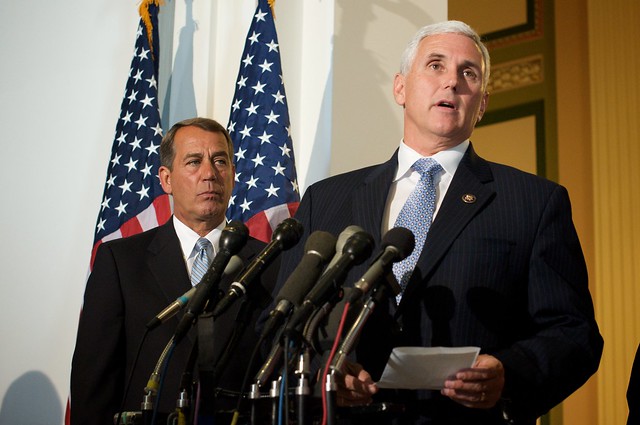Pence's fiscal recklessness is hurting Indiana's ability to fund state priorities, including public schools in 2015 and beyond
02/03/2014
 Upon taking office, Governor Pence has continued the same Washington DC games of cutting taxes and creating more government programs that led this country into a fiscal crisis.
Upon taking office, Governor Pence has continued the same Washington DC games of cutting taxes and creating more government programs that led this country into a fiscal crisis.
For any proof of this failed political game, look no further than Governor Pence’s 2014 “Legislative Roadmap.” His “roadmap does little but cost the state’s already-scarce resources and interferes with legislators’ ability next session to craft a 2015-16 budget that will be fair to all of the state’s needs and services –most especially K-12 education.
Indiana’s legislature works on a 2-year cycle with one year being a “long” session and the following year being a “short” session.
Long Sessions are long because the General Assembly is constitutionally required to develop a biennial budget and craft a school funding formula—both of which take time. Short Sessions are short because they do not take up “budgetary” issues that are not bona fide emergencies.
During short sessions, whenever lobbyists and advocacy groups (including ISTA) try to push for measures that will likely cost the state new money—we are quickly and summarily told that “it’s a short session…bring that back next year when all issues will have equal standing before lawmakers as the next budget is drafted.”
The same rules that apply to teachers’ organizations, cities and counties, taxpayer groups, hospitals, family and social advocates, etc… should also apply to Indiana’s Governor.
A brief summary and cost to taxpayers for some of Governor Pence’s legislative priorities this short session are:
Elimination of the Business Personal Property Tax - SB1 / HB1001 - $1,000,000,000
The complete elimination of this tax will cost over $1 billion to local government and public schools. Governor Pence did not suggest in his Roadmap any particular replacement revenue. SB 1 exempts smaller business from the tax and phases down the corporate income tax rate. HB 1001 sets up the scenario where counties locally decide whether to eliminate the business personal property tax in their county. Neither of these alternatives speak to replacing revenue. Both of these alternatives are flawed.
Indexing Family Tax Exemptions - HB1211 - $5,500,000 in the first year…more with each year.
This bill would change Indiana’s individual and dependents’ exemptions so that it is determined based upon the Consumer Price Index—meaning taxpayers will get to exempt more of their income from taxation. This results in less revenue for needed public services.
Preschool Voucher Expansion - HB1004 - $18,000,000 (median of estimate range)
This bill sets up a 5-county preschool pilot program as well expands the K-12 voucher program by giving a direct line to parents who acquire a preschool voucher to be automatically eligible for a K-12 voucher
“Choices” for Teachers Program - SB264 - $2,500,000
This bill gives $10,000 stipends to a few teachers for two years if the teacher leaves their existing non-charter school and goes to either a non-charter school that has been graded as a D/F or any charter school with more than 50% on the free- or reduced-price lunch program.
It’s these types of new expenditures in a non-budget “short” session year that are setting up for failure future budget-writing efforts and, in the process, un-leveling the playing field for other program priorities.
In the spirit of what the late Senator Everett Dirksen famously said, “A billion here, a billion there, pretty soon, you’re talking real money.”
Please contact your state representative and state senator and urge them not to give the governor “special favors” in a short session.